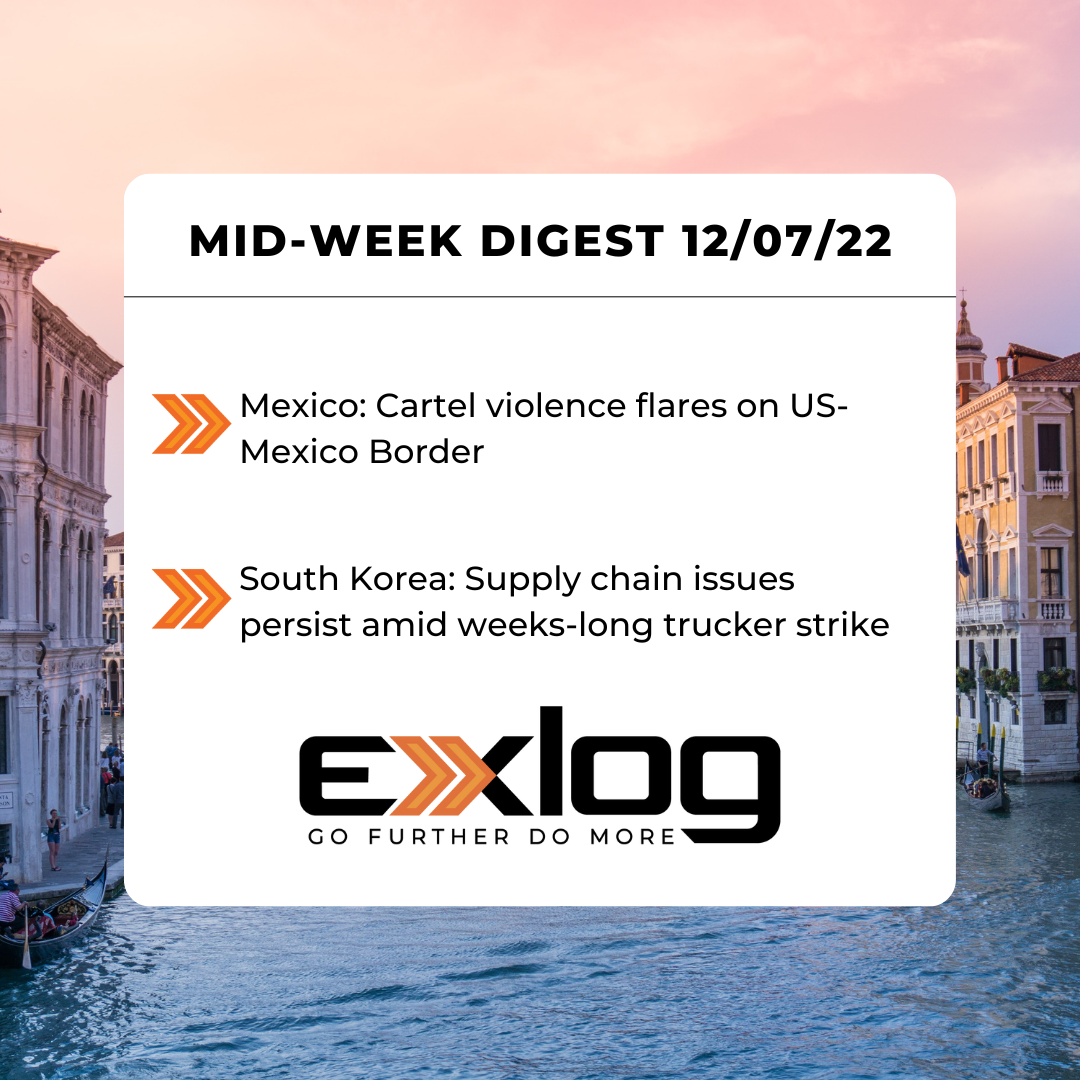Cartel violence flares on US-Mexico Border and South Korean truckers continue labor strike
Mexico: Cartel leader’s arrest triggers clashes in Nuevo Laredo
The arrest of a Northeast Cartel (Cartel del Noreste, or CDN) leader in Nuevo Laredo on Nov. 28, which triggered armed confrontations between Mexican military and CDN personnel as well as travel disruptions across the city, threatens to destabilize the security environment in the state of Tamaulipas over the medium term. The arrest and ensuing violence prompted the US Consulate in Nuevo Laredo to issue a security alert advising employees to shelter in place. Local authorities also closed schools, suspended public transportation services, and urged residents to avoid the affected areas. Cartel members burned vehicles and installed roadblocks along key thoroughfares in the city, as well as on the freeway between Nuevo Laredo and Monterrey. The clashes also interrupted operations at maquiladoras (factories owned by foreign companies) where employees were forced to halt their activities and take refuge. Similar violence and disruption occurred in March, when the arrest and subsequent extradition of another CDN leader triggered a wave of retaliation from the cartel; assailants armed with firearms and hand grenades attacked the US Consulate and Mexican military facilities, and paralyzed traffic in central Nuevo Laredo by burning vehicles and placing spike strips on several roads. Despite the recent high-level arrests targeting CDN leaders, the tactical capabilities demonstrated by the cartel on Nov. 28 indicate that it remains the dominant drug trafficking group in northern Tamaulipas, including Nuevo Laredo. However, any perceived weakness could embolden rival criminal actors seeking territorial expansion and control of Nuevo Laredo’s smuggling routes, including CDN’s largest competitors; this includes the Jalisco New Generation Cartel (CJNG), which has been seeking a stronger presence in northeastern Mexico and control of strategic drug trafficking routes along the US-Mexico border. Additionally, government counternarcotic strategies targeting cartel leadership have historically been ineffective at decreasing cartel violence – instead, arrests have often created power vacuums and fomented inter- and intra-cartel competition. Escalation of cartel disputes has the potential to significantly alter the security and operational environment in Nuevo Laredo and the state of Tamaulipas, with major disputes posing a threat to travel and business disruptions on both sides of the US-Mexico border.
South Korea: Supply chain issues persist amid weeks-long trucker strike
Thousands of South Korean truckers seeking better pay and working conditions have been on strike since Nov. 23 – the second such work stoppage since June – causing supply chain disruptions and nationwide protests. The Ministry of Industry, Trade, and Energy estimates that the first 10 days of the strike cost KRW 3.2 trillion (USD 2.4 billion), as a backlog of goods and materials awaits shipment. The Korean Ministry of Land, Infrastructure, and Transport (MOLIT) reported in late November that work had stopped at hundreds of construction sites across the country due to a lack of materials, particularly concrete. Fuel supplies have also been disrupted; media outlets and local authorities report that 96 fuel stations had run dry as of Dec. 6 – with more than half located in Seoul and the surrounding Gyeonggi province. The striking workers belong to the Cargo Truckers Solidarity Union (CSTU) and are demanding that the government permanently adopt measures intended to guarantee a minimum wage and minimize safety issues associated with overwork. The walkout began after Korean authorities failed to renew the measures indefinitely, opting instead for a three-year extension. Following failed negotiations with union leadership, the South Korean government imposed an unprecedented return-to-work order on Nov. 29; while this order only applies to roughly 2,500 truck drivers in the cement industry, authorities are reportedly preparing to extend it to drivers in the oil and steel sectors. Failure to comply is punishable by up to three years in jail or a maximum fine of KOR 30 million (USD 22,400). The controversial order sparked protests throughout South Korea, including large but peaceful labor demonstrations in 15 cities on Dec. 6 organized by the Korean Confederation of Trade Unions (KCTU) – an umbrella organization that includes the striking truck drivers. The KCTU also called for a nationwide general strike to begin on Dec. 6, though initial reports suggest low levels of member participation. The future of the truckers’ walkout remains uncertain; while official figures appear to show that many drivers are complying with the Nov. 29 back-to-work order and that the total number of drivers on strike is now roughly half the initial figure, CSTU representatives have stated they plan to redouble their protest efforts beginning Dec. 7. Nonetheless, supply chain disruptions have reportedly begun to ease in some sectors, indicating that the worst impacts of the strike have likely passed. Port activity and cement shipments were both near-normal as of Dec. 7, according to the MOLIT, and the government has mobilized military fuel trucks to some areas experiencing shortages. Lingering supply chain disruptions remain likely in other impacted sectors, however, and renewed union protest activity cannot be ruled out in major cities in the days ahead.


